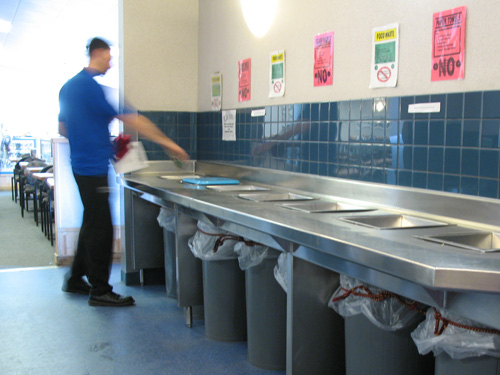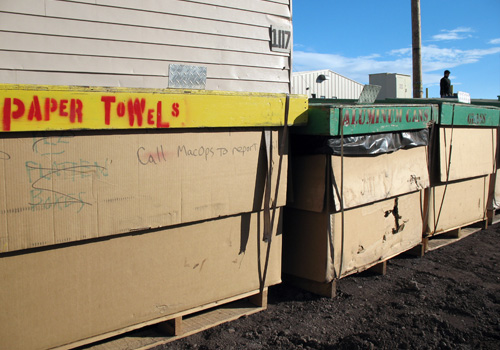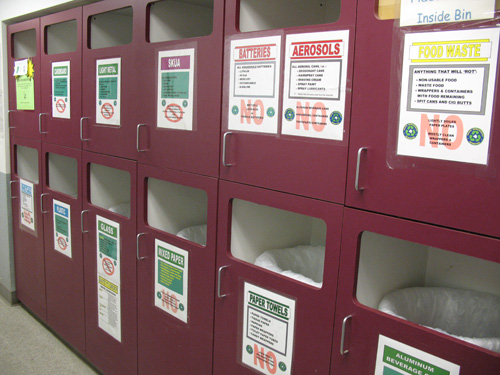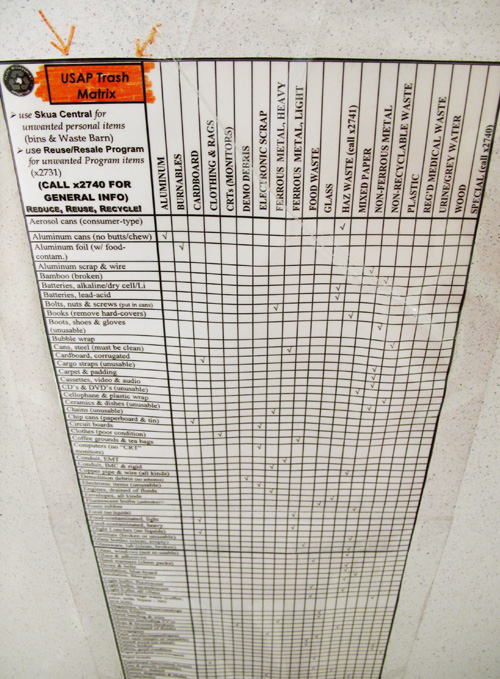 One of the first things you notice on arriving at McMurdo are the multitudinous recycling bins. They line the hallways. They greet you in entranceways. They lurk in stairways, corners, restrooms. They cover 20 different categories, and residents sort their trash accordingly. Thanks to general compliance, McMurdo's recycling rate now stands at around 66% (up from 61% in ’98), considerably higher than any state in the U.S. Environmental responsibility is the primary reason for recycling here, but another factor is cost. The USAP spends about $800,000 a year to ship and dispose of its waste from Antarctica. Recycling cuts waste managements expenses by $80,000, allocating much-needed funds to research and operations.
One of the first things you notice on arriving at McMurdo are the multitudinous recycling bins. They line the hallways. They greet you in entranceways. They lurk in stairways, corners, restrooms. They cover 20 different categories, and residents sort their trash accordingly. Thanks to general compliance, McMurdo's recycling rate now stands at around 66% (up from 61% in ’98), considerably higher than any state in the U.S. Environmental responsibility is the primary reason for recycling here, but another factor is cost. The USAP spends about $800,000 a year to ship and dispose of its waste from Antarctica. Recycling cuts waste managements expenses by $80,000, allocating much-needed funds to research and operations.  The USAP achieves these results through an environmental education program and station-wide campaign that continually emphasizes the importance of recycling. Participants are required to take a waste management course shortly upon arrival that explains the benefits of refuse separation and how the system works. The program also owes its success to McMurdo's structured lifestyle and a relatively small community whose well-being depends on shared responsibility and cooperation.
The USAP achieves these results through an environmental education program and station-wide campaign that continually emphasizes the importance of recycling. Participants are required to take a waste management course shortly upon arrival that explains the benefits of refuse separation and how the system works. The program also owes its success to McMurdo's structured lifestyle and a relatively small community whose well-being depends on shared responsibility and cooperation.  Here's a typical recycling bay found in dorms and public buildings around town. Its 12 receptacles' categories are fairly general in nature, whereas bins at Crary Lab, for example, might include "Lab Glass" and hazmat categories.
Here's a typical recycling bay found in dorms and public buildings around town. Its 12 receptacles' categories are fairly general in nature, whereas bins at Crary Lab, for example, might include "Lab Glass" and hazmat categories.  Not sure where to deposit something? Consult the Trash Matrix, a lengthy A to Z of what belongs where. Still, it won't list everything. Tea bags, for example. That one threw me, since it's part food, part paper. "If in doubt, leave it out!" reads a sign near the matrix. So I asked someone in the know. The answer: Tea bags go in the food waste bin. You won't hear from me for the next 2 or 3 days while I'm overnighting at Field Safety Training (Survival School) out at Snow Mound City. It's an exercise which involves wearing a bucket over one's head and building a snow shelter (though not at the same time, thankfully). Those who've seen the fabulous film Encounters at the End of the World will know what I'm talking about. In either case I'll fully describe the experience when I get back. Also on my return, we'll meet Waste Supervisor James Van Matre to find out how waste management operates and how I'll go about collecting material for my artwork. See you then.
Not sure where to deposit something? Consult the Trash Matrix, a lengthy A to Z of what belongs where. Still, it won't list everything. Tea bags, for example. That one threw me, since it's part food, part paper. "If in doubt, leave it out!" reads a sign near the matrix. So I asked someone in the know. The answer: Tea bags go in the food waste bin. You won't hear from me for the next 2 or 3 days while I'm overnighting at Field Safety Training (Survival School) out at Snow Mound City. It's an exercise which involves wearing a bucket over one's head and building a snow shelter (though not at the same time, thankfully). Those who've seen the fabulous film Encounters at the End of the World will know what I'm talking about. In either case I'll fully describe the experience when I get back. Also on my return, we'll meet Waste Supervisor James Van Matre to find out how waste management operates and how I'll go about collecting material for my artwork. See you then.